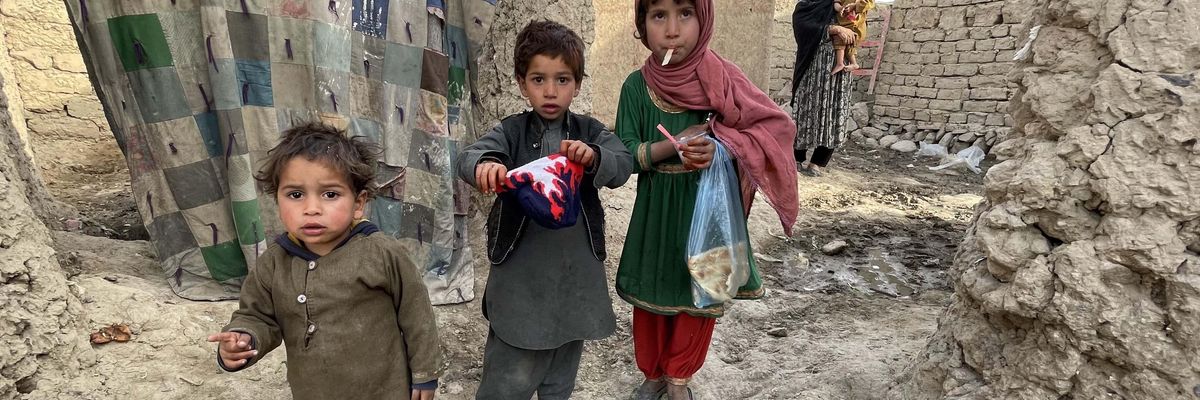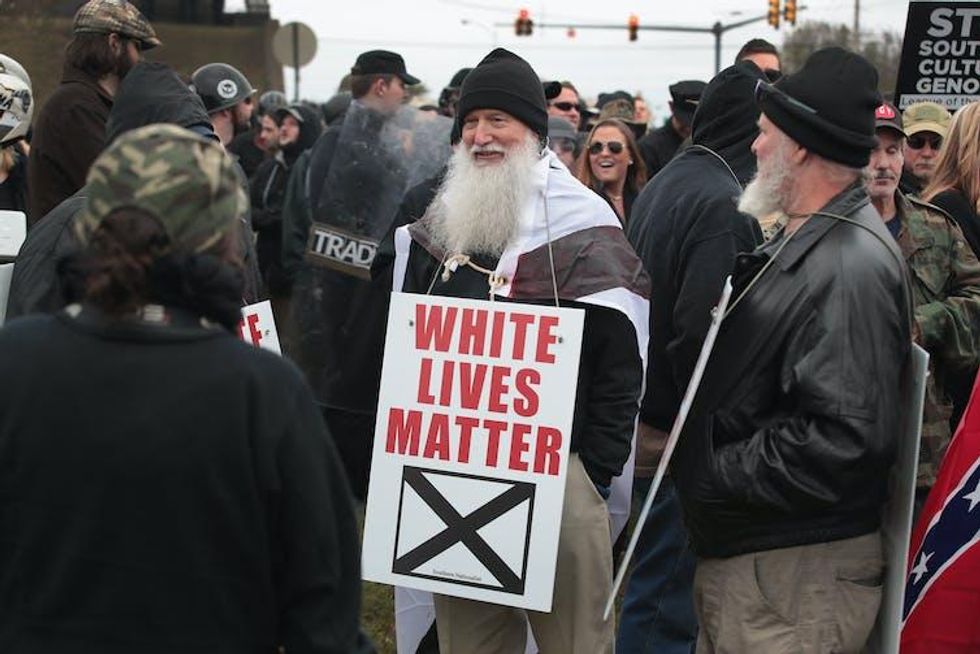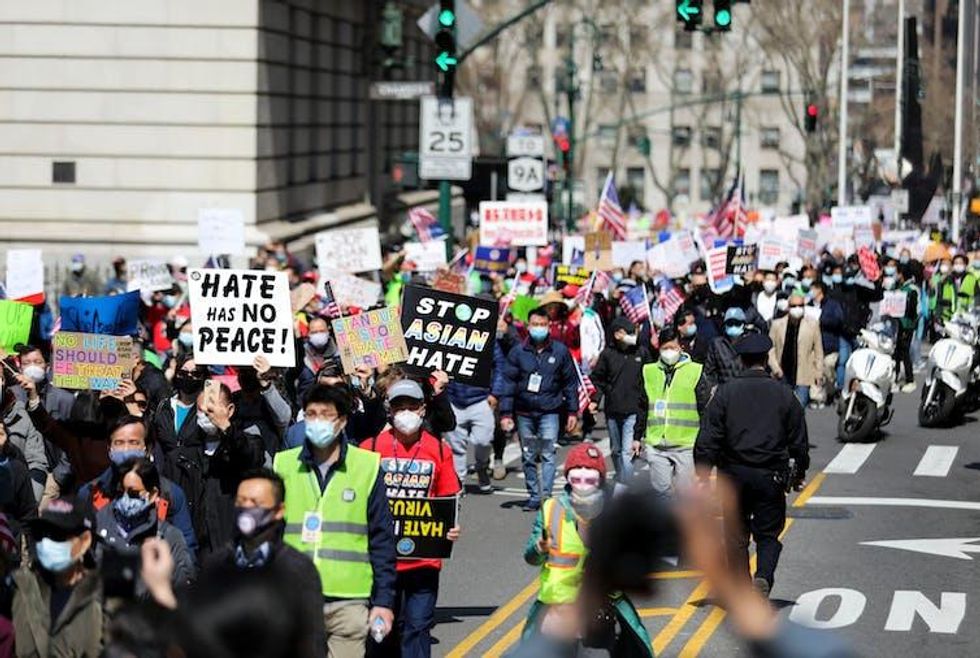The effects of American racial bias and anti-Asian sentiment do not end at the nation's borders. The racial attitudes of white people also influence their support for American military intervention abroad, according to our working paper on U.S. foreign policy and racism.
White Americans who hold racist beliefs are significantly more likely to endorse aggressive military interventions over diplomacy or economic strategies in foreign countries at odds with the United States, if the residents of those countries are perceived as nonwhite.
This is particularly true when it comes to China.
Race and public opinion
Researchers have long known that race and racism powerfully shape white Americans' views on domestic issues like social welfare and criminal justice.
Scholars have given less attention to how the racial resentment harbored by white people influences their foreign policy views, in part because the typical voter cares less about foreign policy than about domestic policies that affect their everyday lives.
But when tensions between the U.S. and another country escalate, as they have lately with Iran, North Korea and China, popular interest in foreign policy rises. That can influence policy decisions.
To analyze how racial attitudes affect support for U.S. military action abroad, we examined 30 years of public opinion data collected by one of the country's longest-running national public opinion surveys, the American National Election Study. Our analysis focused on answers by white Americans from 1986 to 2016.
Specifically, we examined their responses to the "racial resentment" scale. Social scientists use this meticulously tested set of questions to assess anti-Black prejudice in the post-civil rights era. In recent decades, white Americans have become less willing to express explicitly racist views, such as opposing interracial marriage or supporting segregation. But they may still harbor bigoted perceptions, doubting Black Americans' work ethic or commitment to self-reliance, for example.
The racial resentment scale is designed to capture this kind of discriminatory anti-Black views.

Social scientists have repeatedly demonstrated that white people who hold such views are also likely to hold negative views of other nonwhite U.S. populations, including Latinos, immigrants, Muslim Americans and Asian Americans.
Based on responses to the racial resentment scale in the most recent American National Election Studies-administered in 2012 and 2016 to about 3,000 non-Hispanic white respondents each-we found that racist attitudes are correlated with and meaningfully influence white Americans' support for U.S. military interventions in other countries.
For example, people with racist attitudes favored more aggressive action against Iran. Thirty-five percent would support bombing Iranian suspected nuclear development sites, compared with 15% of whites with less racist attitudes and 31% of white Americans overall.
White Americans with racist views also favor military engagement against Muslim populations. For example, they are five percentage points more supportive of continuing the global "war on terror" than the overall white population, 46% to 41%.
Because a number of factors influence people's foreign policy opinions-including educational status, income, gender, ideology, military service and partisan affiliation-we adjusted for these in our study. We also controlled for respondents' reported attention to political news, their level of white ethnocentrism and their authoritarian leanings.
We find that racial resentment has a significant effect above and beyond these other variables.
Anti-China views
Racial resentment seemed especially influential in white American views of China-which has become an economic and political competitor to the U.S. over the last decade.
In 2012, of the 3,196 white Americans surveyed in the American National Election Study, 28% believed that China posed a "major" military threat to the U.S., 53% saw China as a "minor" threat and 19% did not see China as a threat. Racially resentful whites were 36 percentage points more likely to see China as a major threat than other white respondents, according to our analysis.
In 2016, 3,505 white Americans answered the same survey questions about China. Forty-five percent saw China as a "major" threat to the U.S. and 43% saw it as a "minor threat"; only 11% of whites believed that China presented no threat to the U.S.
Again, racial attitudes strongly shaped these perceptions. Our analysis found that whites with racist attitude were 20 percentage points more likely to consider China a major threat in 2016 than other whites.
While at first glance this might suggest that racial attitudes were less of a factor in 2016 than 2012, the lower percentage reflects the fact that a much higher percentage of Americans viewed China as a threat in 2016 than 2012.
This trend continued during the presidency of Donald Trump, who portrayed China as a great adversary, calling it a "threat to the world." Today 22% of all Americans see China as the greatest enemy of the U.S., according to a 2020 Gallup poll.

A vicious cycle
Americans' growing perception of China as a threat comes as both countries compete for control over the South China Sea.
China and the U.S. routinely deploy weapons and engage in military planning and exercises in the South China Sea. U.S. President Joe Biden frames tensions between the two countries as a competition between democracy and autocracy. He has described relations with China as one of the top priorities of his administration.
[Like what you've read? Want more? Sign up for The Conversation's daily newsletter.]
Many analysts, including high-ranking U.S. military personel, view the risks of violent conflict between the U.S. and China as relatively low.
But all that saber-rattling in the South China Sea, and years of heated presidential rhetoric under Trump, have domestic implications. Studies suggest that when politicians describe the relationship between the U.S. and China as a "great power competition," it stokes anti-Asian beliefs among white Americans.
These anti-Asian beliefs, in turn, make white Americans more likely to see China as a major threat, according to our research-one potentially worthy going to war over. We document a vicious cycle of racial animosity with potentially global consequences.






